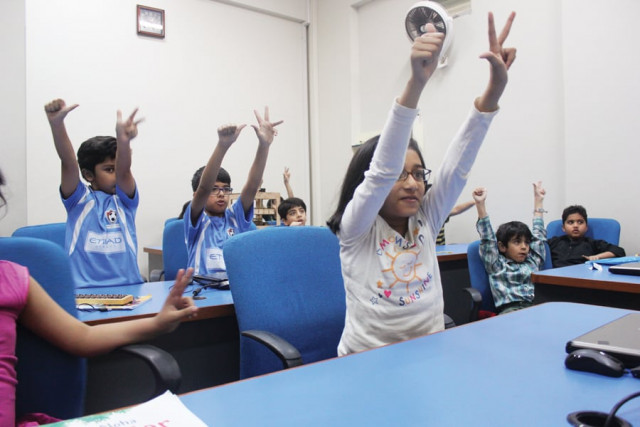Mind over math: Children learn to use ‘imaginary abacus’
Students of the ‘Mind Mathlon 2014’ display the benefits of a unique calculating technique.

Students of the programme learn to use mind math for complex mathematical operations. PHOTO COURTESY: ROBOTICS LAB
Raising and lowering their fingers, they began to calculate as she asked them to add and subtract double-digit numbers. With astonishing accuracy, they managed to keep track of long series of numbers read out to them and calculated the final result in their head.
The children were students of the Mind Mathlon 2014 programmme at Robotics Lab held at the Karachi Institute of Technology and Entrepreneurship on Saturday. The students took turns on stage using their hands as the beads of an abacus — a calculating tool constructed in a wooden frame with beads sliding on wires - to add and subtract as fast as, if not faster than, a calculator.
The fingers on the right hand represented unit numbers while an open right thumb would be interpreted as the number five. Each finger on the left hand is used to tally tens and the left thumb corresponds to the number 50. For instance, if you give someone two thumbs up, a mind math student would read that as 55. The disadvantage of using this method however, is that it is limited to numbers between zero and 99.
One of the students participating in the programme was visually impaired but he was able to calculate just as well as every other student, which suggests the possibility that the technique may be useful in the future for teaching math to other children suffering from visual impairment as well.
According to the founder and CEO of Robotics labs, Yasin Altaf, mind math can be used for a longer range of numbers and is also useful for multiplication, division and more complex mathematical operations.
The students are taught how to use “an imaginary abacus”, Altaf said, adding that they can perform all the calculations they need to by moving beads on an abacus in their imagination and do not actually need to carry one around.
Altaf said that mind math helps to sharpen the minds of those who learn it and also improves listening skills. If you lose track of what you are doing on paper, you can retrace your footsteps, he said. However, in mind math, students have to pay attention or they will not get the right answer, he added.
Published in The Express Tribune, March 10th, 2014.



















COMMENTS
Comments are moderated and generally will be posted if they are on-topic and not abusive.
For more information, please see our Comments FAQ